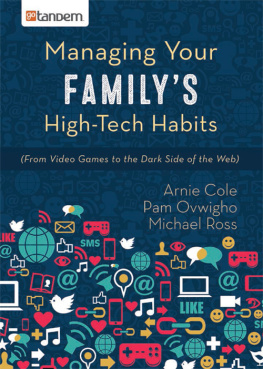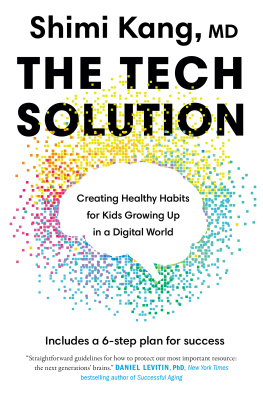
2015 by Back to the Bible
Print ISBN 978-1-63058-373-6
eBook Editions:
Adobe Digital Edition (.epub) 978-1-63409-453-5
Kindle and MobiPocket Edition (.prc) 978-1-63409-454-2
All rights reserved. No part of this publication may be reproduced or transmitted for commercial purposes, except for brief quotations in printed reviews, without written permission of the publisher.
Churches and other noncommercial interests may reproduce portions of this book without the express written permission of Barbour Publishing, provided that the text does not exceed 500 words or 5 percent of the entire book, whichever is less, and that the text is not material quoted from another publisher. When reproducing text from this book, include the following credit line: From Managing Your Familys High-Tech Habits, published by Barbour Publishing, Inc. Used by permission.
Scripture taken from the H OLY B IBLE , N EW I NTERNATIONAL V ERSION , NIV . Copyright 1973, 1978, 1984, 2011 by Biblica, Inc. Used by permission. All rights reserved worldwide.
The authors are represented by and this book is published in association with the literary agency of WordServe Literary Group, Ltd., www.wordserveliterary.com.
Published by goTandem, an imprint of Barbour Publishing, Inc., P.O. Box 719, Uhrichsville, Ohio 44683, www.barbourbooks.com
Our mission is to publish and distribute inspirational products offering exceptional value and biblical encouragement to the masses.

Printed in the United States of America.
Introduction: Are We Connected or Addicted?

Video Games, Twitter, Smartphones, Instagram: Everyone Is Riding the Wave of High-Tech Gadgetsand Sometimes Paying a High Price
In the last two decades, our society has been transformed by high-tech gadgets, particularly the ubiquitous smartphone and tablet. Most of us carry at least one of these devices with us at all times and in all circumstances. In fact, nine out of ten US adults own a cell phone and 58 percent have a smartphone. Two-fifths of us own a tablet computer.
I (Pam) remember getting my first cell phone before I left home for graduate school. My sole motivation was so that I could call for help if my car broke down. Now Im one of the majority of Americans who carries a smartphone so that I can stay connected to work, family, and my kids schools no matter where I am.
Technology touches our lives in so many ways today that its difficult to remember how things were before. We waited for the weather report on the local news to decide if we needed to carry an umbrella tomorrow. Now we check it instantly on a weather app as were walking out the door. Staying in touch with family and friends meant phone calls, letters, and even printed pictures sent through the mail. Navigating in a new city required detailed directions and often a map.
As hard as it may be for those of us over thirty to remember that life, its completely unknown to most millennials. Think about it: a world without smartphones, iPads, and Xboxes is as foreign to our kids as Little House on the Prairie is to us!
A few years ago I was talking with Indigo, a young neighbor girl, about her research project on Martin Luther King Jr. She was feeling stressed because her family no longer had Internet access at home and she didnt know how she was going to find the information she needed for her project. When I suggested that she go to the library for some books, she gave me a blank stare. Then when I described how to look up resources and find them in the library, she looked at me as if I had just landed from the planet Pluto and had asked her to take me to her leader.
The truth is Indigo and her generation are digital natives. As Dr. Archibald Hart and Dr. Sylvia Hart Frejd note in their book The Digital Invasion, The term digital native describes those born after the advent of digital technology. Obviously, they are the younger generation. This group is also referred to as the iGeneration having been born with digital DNA. For Indigo and others of her generation, high-tech gadgets are simply the way things are done.
So if technology gives us all of these good thingsstaying in touch with loved ones near and far, traveling easier, finding information without a trip to the library, and so onwhy a book on managing your high-tech habits? (Actually, if youve picked up this book, we suspect you already know why.)
The Lure of Those Little Blue Screens
In a thought-provoking article on teens and technology, Joanna Moorhead writes:
Teenagers can seem obsessed with their mobile: checking them every few minutes, texting people all the time, checking to see how many likes theyve got after theyve posted on social media, refusing to put their phones to one side when theyre sitting round the table for Sunday lunch. Then again, that reminds me of some other people I knowme and my husband. Were pretty wedded to our phones as well. Challenge us about it (our teenagers certainly do) and well cheerfully reassure you that its all to do with work, that were just monitoring some news story, or that were waiting for an important call. Sadly, though, I have to admit that the reason I check my phone too often is probably for the same reasons my daughters do the same with theirs: boredom and insecurity. Teenagers, of course, have these issues by the bucketload, and I sometimes think mobiles have made adolescents of us all.
Have you noticed? Many of us seem more controlled by our high-tech gadgets than theyre controlled by us. A truth we cant escape is that those little electronic devices we love so much can have some pretty nasty side effects. For example
The temptation to answer every electronic ping has us constantly checking our devices whether were at work, school, or church or having dinner with friends or watching our childs dance recital. Our divided attention degrades our manners and robs us of true real-life moments.
Constant connection through emails, texts, and social media leaves us overtaxed with little room for quiet and relaxation. Our minds, bodies, and spirits need rest to function properly. Multiple interruptions each day mean that we expend more energy completing tasks than is really necessary.
Our social media presence becomes another part of our identity. We can become obsessed with curating our image on Facebook, Instagram, and Twitter. We start to measure our self-worth by how many friends, followers, and likes we have.
Video and online games and some aspects of social media are so rewarding that we feel compelled to keep playing. Time spent trying to level up in the latest game takes away from other activities, including important ones like sleeping, exercising, and spending time with God.
Pornographic and violent content is just a click away with the endless variety of games, videos, and the Internet. One-fourth of all Internet searches and more than a third of all downloads are pornography-related. Seventy percent of young men (ages eighteen to twenty-four) visit a pornographic website at least once a month.
You may read through this list and think it was written by a bunch of technophobes. That is definitely not the case. Professionally we are part of a ministry that uses media and technology to help people move closer to Jesus on a daily basis. Weve spent the past eight years developing goTandem, a customized Bible-engagement and spiritual growth app that meets you at your spiritual level and walks with you daily.












